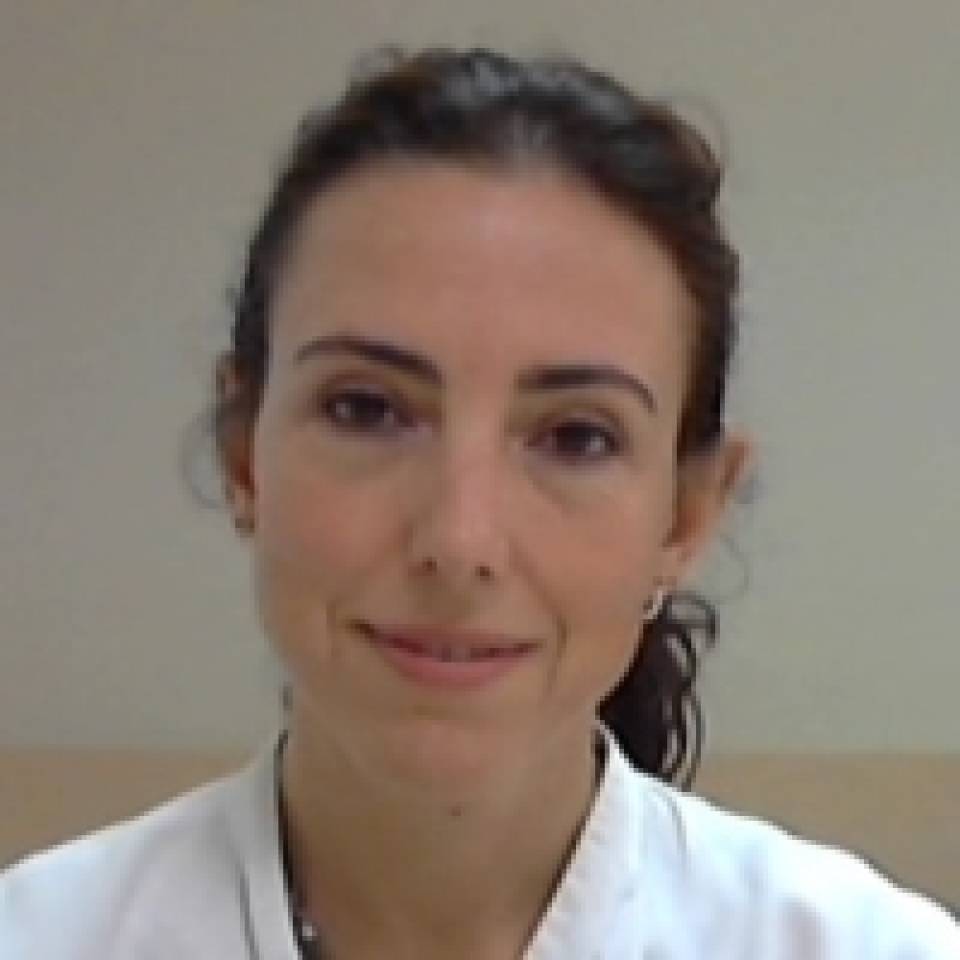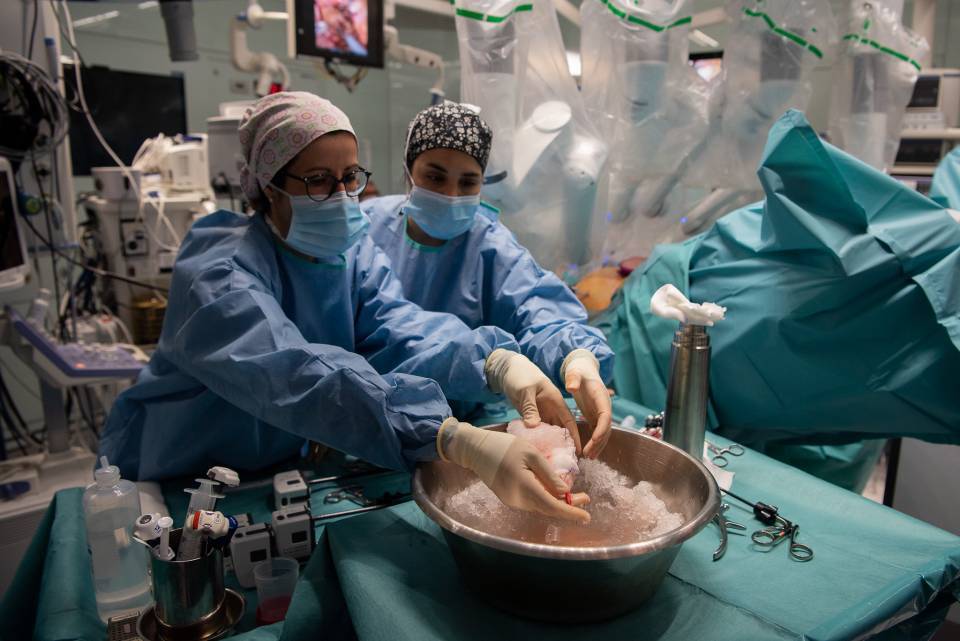- What is it?
- Pre-transplant testing
- Transplant phases
- Living with the disease
- The procedure at Hospital Clínic
- Research at Hospital Clínic
- Teaching and Training at Hospital Clínic
Life after a Heart Transplant
The diet must be personalised in each case as this varies according to whether the patient has an underlying disease such as diabetes or high blood pressure. In general, it should be as balanced as possible, strongly based on the Mediterranean diet and rich in fibre. It is advisable to eat in moderation, as the weight can be gained quickly due to the action of steroids and recovering health. In this way, obesity can become a serious problem.
Tips on how to eat include:

Fruit juices in cartons or freshly squeezed. Liquids may be consumed. The juices must be made from previously washed fruit and consumed when freshly prepared, although it is preferable to eat fruit without juicing it.

Do not eat much salt and, if you have high blood pressure, eliminate it from your diet completely. Substitute it by other condiments such as oregano, thyme, pepper, lemon, vinegar, and so on. Avoid stock cubes, reduce consumption of canned and tinned foods and snacks, as these all contain salt.

Eat as little sugar as possible (pastries, cakes, etc.), as immunosuppressive drugs have a tendency to raise blood glucose.

Food, in general, should be rich in unsaturated fats, such as olive oil, fish, dried fruit and nuts (natural or toasted), as immunosuppressive drugs increase the cholesterol and triglycerides in the blood.

Avoid excessive fried products, casseroles, stews, and cold cuts. Do not eat more than three eggs a week, chocolate (unless it is dark and contains at least 70% cocoa), animal fats (offal, brains, high-fat cheeses, butter and non-vegetable margarine, cream, etc.).

Reduce the quantity of red meat (beef, horse, lamb and pork) and consume more white meat (chicken, turkey, and rabbit).

Wash food well before cooking, including meat and fish (if you purchase a whole piece, clean its insides before storing it in the fridge).

Milk should be skimmed or semi-skimmed, pasteurised and in a carton. Once the carton has been opened, keep it for a maximum of four hours at room temperature or 24 hours in the fridge. Individual portions of milk are available. The high calcium content is good for helping prevent osteoporosis. Milk derivatives (yogurt, cream cheeses, etc.) should also be skimmed.

Vegetables and salads are ideal. These have a lot of vitamins and minerals and high fibre content. Wash them with a few drops of bleach for 10 minutes and rinse them well or use AMUKINA (commercial product). Do this with lettuce or any raw vegetables for the first three months after the transplant.

Cereals are an important part of the diet, especially whole foods. Fruits are highly recommended. You can eat the skin of fruit if it is healthy, but the fruit should be washed beforehand, as should vegetables. Strawberries, cherries, and grapes should be washed whole, together with the stalk. Avoid grapefruit (this interferes with immunosuppression). Do not eat fruit when you are away from home because you never know how this may have been washed.

Do not eat anything raw (fish, meat, cold cuts, seafood, eggs, etc.). Serrano ham and salamis are cured, meaning they are raw and it is not advisable to eat them. You can eat baked ham, luncheon meat, and other cooked sausages. Only eat mayonnaise from a pot. Do not eat handmade mayonnaise, even if you make it at home.

Food must be cooked just before it is eaten and dishes that were cooked hours before and left out of the fridge should not be reheated.

Bottled drinks are sterile while the container (bottle or carton) remains sealed; once opened they should be kept for only four hours at room temperature or 24 hours in the fridge. The same applies to cans.
- Meat and fish should be kept in the fridge, protected with plastic film or in an airtight container. It must be consumed within two days. Minced meat should be consumed on the same day.
- Cooked dishes should be eaten when freshly prepared or refrigerated properly (for a maximum of 24 hours) or frozen to prevent contamination. Meat must be cooked at a high temperature and long enough for the internal parts to lose their red colour; this does not decrease the nutritional qualities but it does remove germs.
- Vegetables should be kept in the fridge in closed containers. Sauces should be kept separately (buy small packages).
- Packaged foods. Check the condition of the packaging, reject any that are open, broken, damaged, warped, or where the packaging emits gas. The containers of canned foods should be changed to prevent rusting and contamination; they should be eaten as soon as possible.
- Never refreeze food once it has thawed out. Reject any with frost (often an indication that the cold chain has been broken).
- Decreased appetite. Eat small meals during the day, consume protein-rich foods and/or drink liquids like milk or juice instead of water.
- Feeling full. Avoid foods that may cause additional gas and do not drink liquids during meals.
- Nausea. Foods high in carbohydrates such as pasta, cereals, bread, and fruit can help. The nausea may also diminish if you drink water with ginger and lemon juice.
- Changes in taste. Use seasonings and spices to improve the taste of the food.

The immunosuppressive medication causes bone loss that may lead to mobility disorders, which could be significant if not prevented. For this reason, it is recommended that adequate physical activity is maintained.

In some cases, it is also necessary to take calcium and vitamin D supplements after a transplant. But the exercise should always be personalised. In other words, not everything suits everybody.

When certain sports are impossible, daily walks are always recommended, as this is a very healthy exercise and usually has no contraindications.

Even if your physical condition allows it, you should avoid overexerting yourself during the first three months. After this period, the level of exercise can be increased. The most advisable sports are walking, golf, swimming, cycling, and so on.

You should not swim in a public swimming pool until one year after the transplant, to avoid possible infection from germs in the water. You must also avoid hot tubs for the first year post-transplant. When you can go to the pool, the water should be chlorinated. It is advisable to use flip flops for both the pool and on the beach, especially in the showers.

It should be borne in mind that violent, competitive or physically demanding sports, such as boxing, football, karate, and so on, are prohibited.
Benefits of sport:
- Strengthens the heart.
- It helps you feel more secure.
- It helps with weight control.
- Reduces blood pressure and cholesterol.
- Reduces stress and the chance of osteoporosis.
- Increases energy levels.
- It helps the body fight infection better.
- It makes you feel healthier.

Most patients are inactive for long periods of time before surgery, which can lead to a large drop in muscle strength and flexibility. Also, during transplant surgery, some of the nerves that help control heart function are cut, making the new heart slower to respond to exercise. It is important to remember this, as it means that when you exercise, your heart rate will not increase like it did in the old heart. In addition, your new heart will beat faster at rest (95-115 beats per minute), and you will have a lower maximum heart rate when you exercise (150 bpm).

Doing warm-ups 10 minutes before exercise improves flexibility and reduces the chance of injury.
You can have sex once you have been discharged from the hospital. However, the following is recommended:
- At the beginning, it is advisable to use comfortable positions that require less physical effort.
- Avoid having sex after eating.
- If you notice that the medication produces any sex-related side effects, discuss this with the transplant team, but do not stop taking your tablets.
- It is advisable to maintain strict hygiene and use condoms for the first months to avoid venereal infections. Good lubrication prevents irritation and infection. Women should know that most condoms are lubricated with silicon dust, but this may not be sufficient and vaginal irritation may occur. It is therefore advisable to cover condoms with water-based lubricant (with silicone or glycerine), which can be found in any pharmacy, specialist stores and sex shops (if you buy them in these stores, check their expiration and approval date). It is important to use only water-based lubricants, as other types of lubricant could damage the condom.
- All female transplant recipients should have a routine gynaecological check-up each year.
Before, during and after a transplant, a patient’s health goes through many ups and downs and they experience various stages of acceptance that may generate discouragement or depression. There may be moments of euphoria where the patient stops caring for themselves and therefore eats everything they shouldn't and has unhealthy habits, or feels sad for no apparent reason. It is possible that they get irritable with themselves or the people around them.
In this case, they should take it easy and ask for help if needed. The patient should try to go about their lives as normally as possible and think about the transplant as a parenthesis or as a stage of a life that continues with the help of the transplanted heart. The first is the responsibility of the medical team; therapists can help with the second; the third depends on the patient’s willingness and positive attitude if they have adverse reactions.
We should be guided by this thought: "I want to live, work, do sport...". It should be remembered that some medications (like prednisone) have side effects including mood swings and may change the patient’s state of mind, especially if the medication is suddenly stopped.
Your medical specialist will let you know when you can go back to work and the GP can sign any forms that are needed for this. It is recommended that people who are able to go to work do so, if their job does not involve significant physical effort. There is no fixed time for post-transplant convalescence. This varies in each case. Usually, after six months you should be physically and psychologically prepared to resume your normal work. However, at the beginning, you should not expect yourself to perform at the same level as before. Avoid excesses and rest whenever necessary.
A transplant patient can start driving again six to eight weeks after the operation, depending on their recovery, complications, and medication. Reflexes and judgement may be affected due to a prolonged stay in the hospital or certain medication. It is best to talk to the medical team before starting to drive again.
As a precaution, it is a good idea to practice driving in an open, low traffic area. The first few times it may be helpful to have another licensed driver in the car.
You can travel when you are fit to do so. You should avoid certain areas where there is a greater possibility of catching infections and only go to places where there is adequate healthcare. However, before you make a decision you must consult your transplant team, who will indicate whether you should take preventative medication for diseases that are present in that area.
When you travel, you should take into account your immunosuppressive medication schedule, because this may alter if you change the country.
- Take sufficient medication for at least two weeks more than the expected length of the trip, in case you are unexpectedly delayed.
- Take a copy of the prescriptions, with the generic name of the medicines you are taking; you should also attach a copy of your medical record.
- Keep the medicines in a safe place. Put them in your hand luggage, not in the hold bags, as those could be lost or delayed. Protect your medicines from temperature extremes. Do not leave them on a shelf or in the glove compartment of your car.
- Drink only bottled or boiled water.
- Eat only cooked or peeled foods.
- If there is a healthcare service, identify yourself as a transplant recipient.
- Always carry the telephone numbers, fax and email of the transplant unit.
- If there is urgent medical assistance in a foreign country, remember that the Spanish embassy can help.
- If you go away for a long time, find out where the healthcare services are and/or people or doctors you could contact if you should need to.
Transplant patients have a greater risk of developing skin cancer. This risk is 65 times higher than in people who have not received a transplant. It is related to the age of the patient, when the transplant was undertaken, and the immunosuppressive medication.
The following are additional risk factors:
- Fair skin or skin that burns easily.
- Being a redhead or blond.
- Blue, green or hazel eyes.
- A family history or prior skin cancer.
- A history of significant sun exposure.
Transplant recipients should always use a sunscreen with a sun protection factor (SPF) of at least 30 to protect the skin. It is also important to wear sunglasses, a wide-brimmed hat and protective clothing, as well as avoid or limit outdoor activities during the time when the sun's rays are the strongest.
Tanning booths are not recommended.
Avoid contact with animals for the first few months. After this time there is no problem, although it is better not to have direct contact with them. They must have their shots up to date, be clean and have annual veterinary check-ups. It is not advisable to keep cats, hamsters, terrapins, monkeys, or any kind of birds. You may keep fish, but you must not touch them or clean out the tank.
Some tips:
- Before and after contact with a dog, wash your hands well.
- Avoid contact with fluids from the animal, like their stools, vomit, saliva, or urine.
- Do not let them lick you.
- Make sure the place they live and sleep is kept very clean.
- Do not let them sleep in your room.
- In the event of a bite, wash the wound rapidly with cold water, put iodine on it, and contact the medical team.
Keep the bin away from the kitchen and food areas. Use plastic bags in the bin and wear plastic gloves. Wash your hands after cleaning the rubbish bin and disinfect it at least once a day.
Because the skin is more sensitive to trauma due to the effects of medication, activities that can cause injury should be avoided. For this reason, if you have a garden, you should wear gloves and long trousers. For the first six months, it is best not to take care of the plants. Do not touch the soil, as infections can be transmitted by fungi.
Substantiated information by:




Published: 15 July 2019
Updated: 15 July 2019
Subscribe
Receive the latest updates related to this content.
Thank you for subscribing!
If this is the first time you subscribe you will receive a confirmation email, check your inbox


